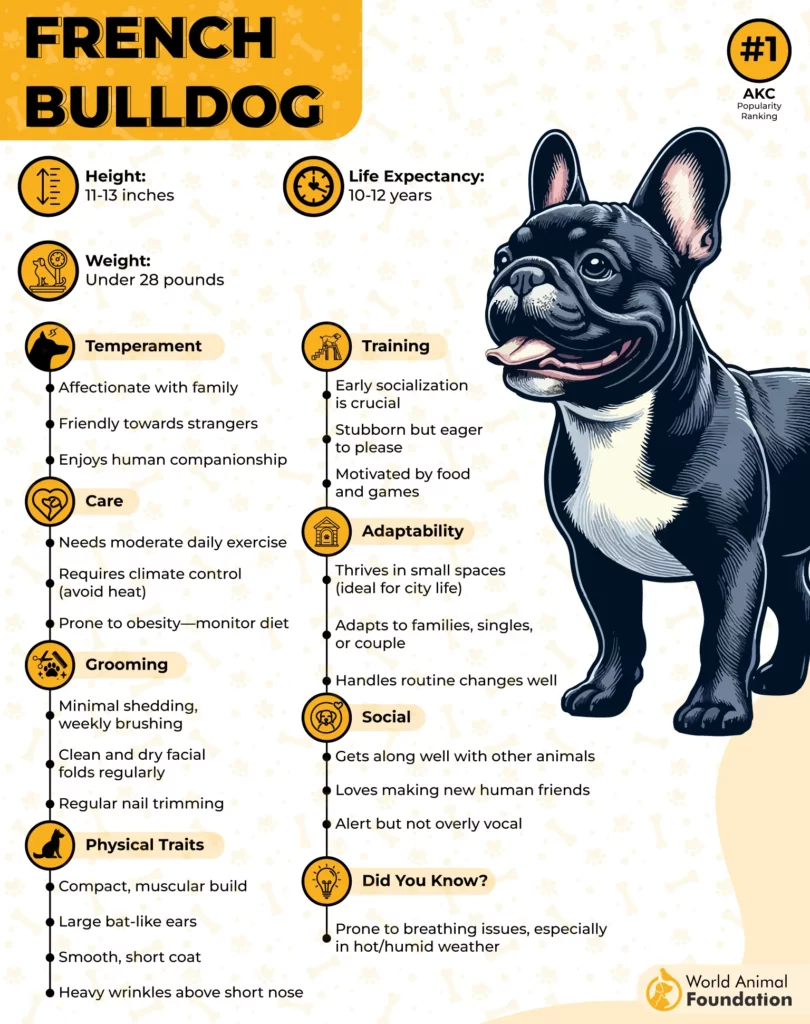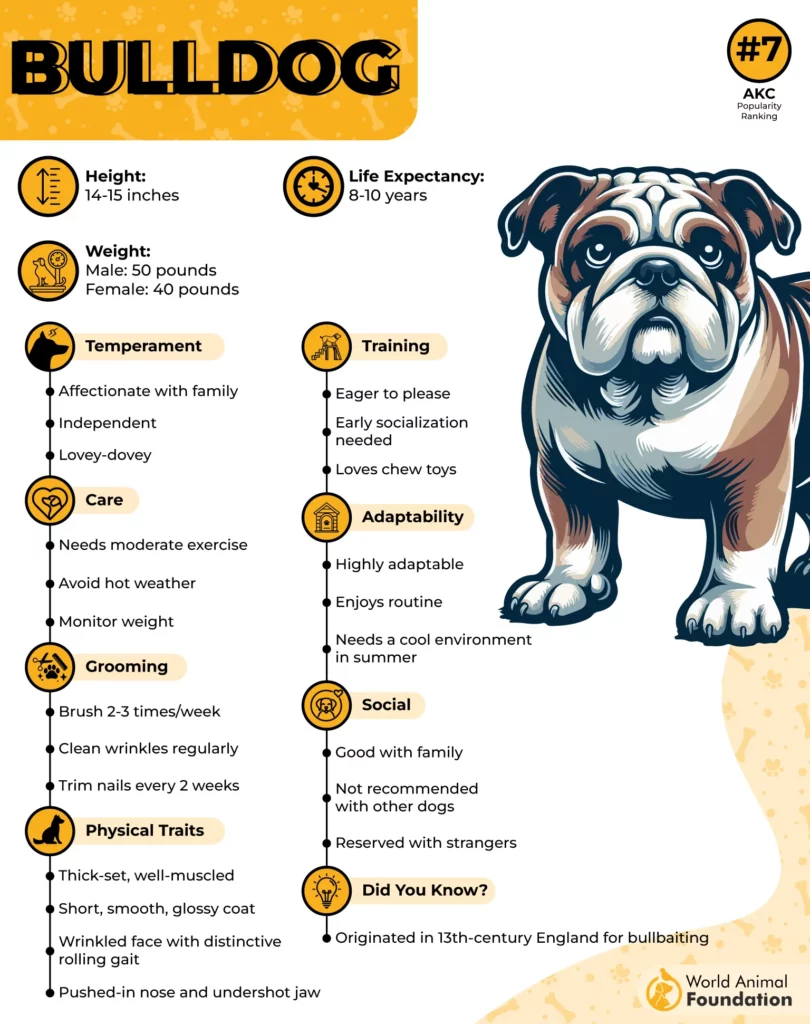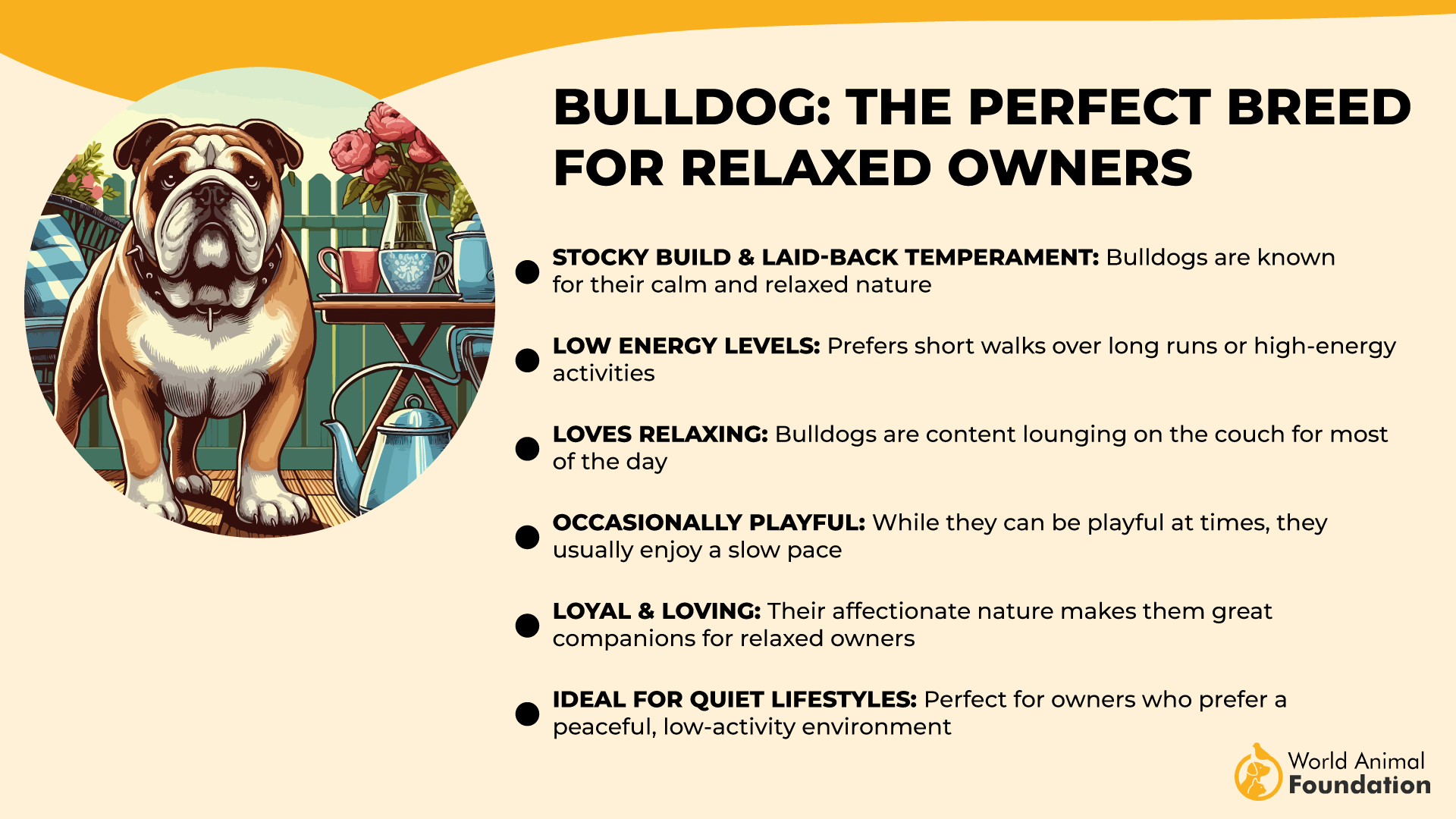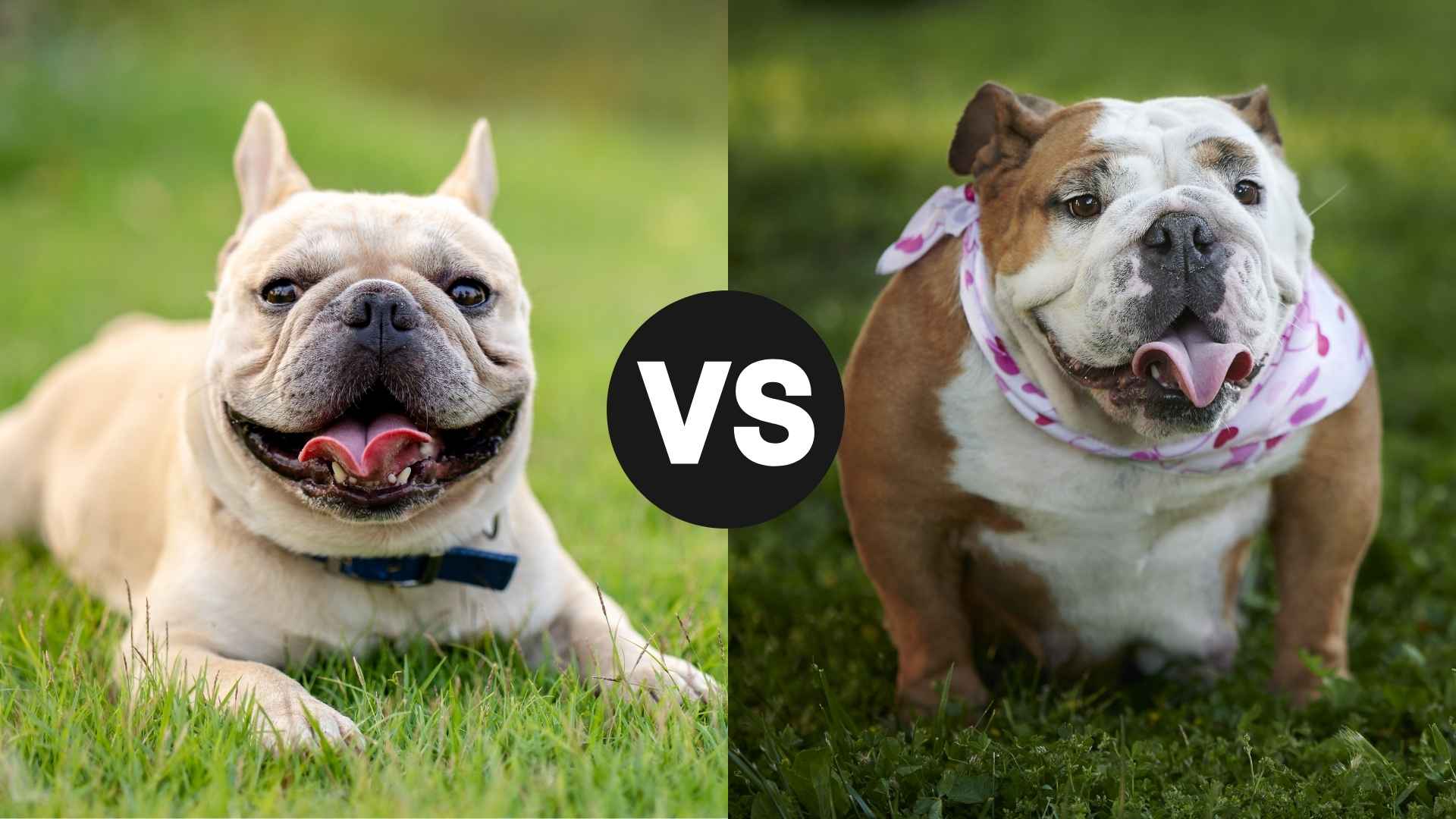French Bulldogs and English Bulldogs may look similar at first glance, but their personalities, energy levels, and care needs are quite different. If you’re trying to decide between these two adorable breeds, you’re not alone!
Maybe you love the Frenchie’s playful and social nature, or perhaps the relaxed, easygoing vibe of an English Bulldog speaks to you. If you’re looking for an English Bulldog comparison, you’ll notice they tend to be more laid-back, while Frenchies bring boundless energy.
But which one is the better fit for you? Whether you want a lively little companion or a laid-back buddy, we’re breaking it all down in the simplest way possible. If you’re a dog lover, this guide will help you understand both breeds better.
French Bulldog vs. Bulldog
French Bulldog vs. Bulldog: Physical Appearance
When comparing the physical appearances of French Bulldogs and English Bulldogs, both stand out among popular dog breeds, yet they have distinct characteristics. French Bulldogs are compact, muscular dogs, typically weighing under 28 pounds and standing about 11–13 inches tall.

Their most notable feature is their distinctive large bat ears, which are large, upright, and rounded at the tips. In contrast, English Bulldogs are larger, weighing between 40–50 pounds and standing 13–15 inches tall.

They have small, thin ears located at the back of their heads, known as rose-shaped ears, which fold over rather than standing erect.
Both breeds possess flat faces due to their brachycephalic skulls, but the English Bulldog’s head is notably larger with more pronounced wrinkles. French Bulldogs have a half-flat, half-domed skull, giving them a unique head shape.
Another distinguishing feature is the tail: French Bulldogs typically have a short, straight or screw-shaped tail, while English Bulldogs often have a distinctive curly tail.
Coat colors for both breeds vary, but it’s common to see French Bulldogs with black masks, especially in fawn-colored individuals. According to Pawlicy, both breeds are prone to certain health issues, such as cherry eye, due to their facial structure.
French Bulldog vs. Bulldog: Grooming Requirements
When it comes to grooming, both French Bulldogs and English Bulldogs have short coats, making them relatively low-maintenance. However, there are notable differences in their grooming needs.
French Bulldogs, standing at about 11 to 13 inches at the shoulder, benefit from weekly brushing to remove loose hair and distribute skin oils. Their facial wrinkles should be cleaned regularly to prevent moisture buildup and potential infections.

English Bulldogs, typically standing 14 to 15 inches at the shoulder, also require regular brushing to keep their coat healthy. Due to their deep facial folds, it’s essential to clean and dry these areas thoroughly to avoid skin issues.
Both breeds need regular nail trimming, as overgrown nails can cause discomfort or walking difficulties. Additionally, routine ear cleaning is important to prevent infections.
Bathing should be done as needed, especially during extreme heat, using a gentle dog shampoo. It’s crucial to ensure both Frenchies and English bulldogs are thoroughly dried, especially in their skin folds, to prevent moisture-related issues.
Starting a grooming routine early in a puppy’s life helps them become accustomed to being handled. This practice makes the process easier for the two breeds and the owner.
French Bulldog vs. Bulldog: Temperament and Training Needs
French Bulldogs and English Bulldogs share a lovable disposition, but their personalities differ. Frenchies are fun-loving, social, and playful, while English Bulldogs are calm and enjoy lounging. Both breeds are affectionate, but French Bulldogs tend to be more energetic.
Training these two breeds requires patience and consistency. Purina stated that French Bulldogs respond well to treats and positive reinforcement, while English Bulldogs tend to be a bit stubborn. Keeping sessions short and engaging is key to success.

Early socialization is essential for both breeds to ensure friendly behavior. Exposing them to different people, pets, and environments helps build confidence and prevents timid or aggressive tendencies.
English Bulldogs have a square head and a strong build, making them slower movers. French Bulldogs are small dogs but are more agile. Despite their differences, both need mental stimulation to stay happy.
While both breeds enjoy indoor playtime, French Bulldogs are more active and playful indoors. English Bulldogs prefer short bursts of activity followed by long naps, making them low-energy, amiable companions.

The English Bulldog’s history traces back to bull baiting and blood sport, a cruel sport, but they’ve since become gentle pets. French Bulldogs, developed during the Industrial Revolution, were bred for companionship, explaining their affectionate nature.
French Bulldog vs. Bulldog: Health and Wellness
French Bulldogs and English Bulldogs, both popular breeds, share certain health challenges due to their brachycephalic (short-nosed) anatomy. PetMD mentioned that this physical trait often leads to breathing troubles, making them susceptible to Brachycephalic Obstructive Airway Syndrome (BOAS).
The two breeds are prone to various health problems, including skin infections and joint issues. Regular vet visits are essential to monitor and manage these conditions effectively.
Due to their heavy weight, English Bulldogs are at a higher risk of joint problems such as hip dysplasia. Maintaining a healthy weight through regular exercise is crucial to alleviate stress on their joints.
French Bulldogs, with their more delicate features, are susceptible to certain eye conditions. Regular eye check-ups can help in early detection and treatment.

Both breeds often require artificial insemination for reproduction due to their unique body structures. This method aids in achieving successful pregnancies.
When selecting a bulldog puppy, it’s important to be aware of potential health issues. Choosing a reputable breeder who prioritizes health can help mitigate some risks.
Coat colors like brindle are common in both dog breeds. While color doesn’t directly impact health, certain genetic factors linked to coat color can influence overall wellness.
French Bulldog vs. Bulldog: Life Expectancy
When considering the lifespan of French Bulldogs and English Bulldogs, it’s important to note that both breeds are classified as brachycephalic breeds, characterized by their short noses and flat faces. This anatomical feature contributes to various health challenges, potentially impacting their longevity.
French Bulldogs typically have a lifespan ranging from 10 to 12 years. Their relatively longer life expectancy among bulldog breeds is due to the fact that they are small dogs with slightly fewer health complications.

In contrast, English Bulldogs have a shorter lifespan, averaging between 8 to 10 years. This reduced longevity is often linked to their heavy weight and associated health issues.
Both breeds are susceptible to expensive health issues, including respiratory problems and joint disorders, due to their brachycephalic anatomy. These conditions can significantly affect their quality of life and longevity.
Gender can also influence lifespan, with studies indicating that female dogs often outlive males. Additionally, maintaining a healthy weight is crucial, as obesity can exacerbate existing health problems, further reducing life expectancy.

Prospective owners should be aware that purebred dogs like French and English Bulldogs may have a higher predisposition to genetic health issues. This factor can influence their overall lifespan and health.
Despite these challenges, both breeds are cherished as loving cuddle companions. With proper care, regular veterinary check-ups, and a healthy lifestyle, they can enjoy fulfilling lives alongside their dog owners.
Conclusion
Choosing between an English or French Bulldog depends on your lifestyle and preferences. Both breeds have unique qualities, from the playful and social nature of the Frenchie to the relaxed and affectionate temperament of the English Bulldog.
Understanding their breed history helps explain their traits. English Bulldogs were once bred for strength, while French Bulldogs were developed as companion dogs. These backgrounds shape their personalities and care requirements today.
One key difference is lifespan—French Bulldogs generally have a longer lifespan, averaging 10–12 years, while English Bulldogs typically live 8–10 years. Their health needs play a big role in their longevity, requiring attentive care.
Their short muzzle gives them an adorable look but also makes them prone to breathing difficulties. Owners should be mindful of temperature regulation and avoid overexertion to ensure their well-being.
Getting your dog from dedicated breeders who prioritize health and responsible breeding practices can make a huge difference. This helps reduce the risk of genetic issues and ensures a healthier pet.
Whether you choose a French Bulldog or an English Bulldog, both make loving companions that bring joy to any home. Ready to welcome one into your life? Research reputable sources and avoid air travel risks, as these breeds are often restricted from cargo flights for their safety.


